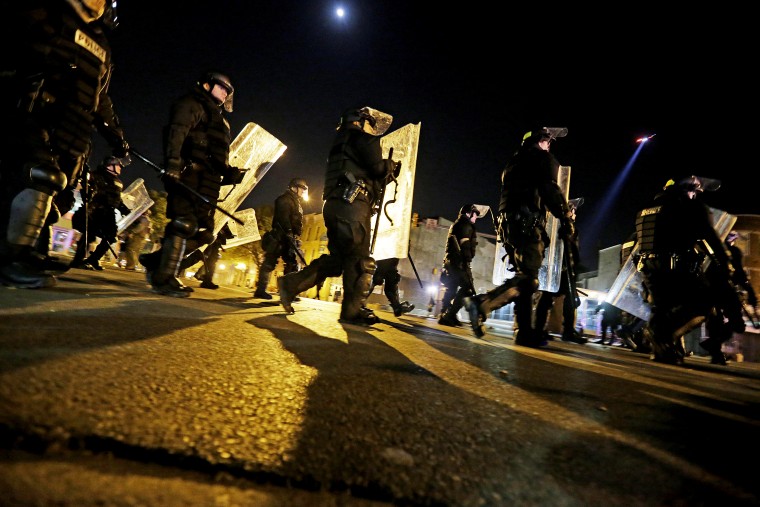In Michigan, we did it for Aiyana Stanley-Jones, a seven-year-old black Detroit girl whose life ended when a SWAT officer allegedly barged through the door of her family’s home during a raid and shot her in the head. The SWAT officer had all charges against him dropped.
We did it too for Aura Rosser, a middle-aged black Ann Arbor woman killed earlier this year during a domestic-dispute call by a police officer who, for whatever reason, felt a need to fire his service weapon even as his partner deployed only a Taser to stop Rosser. An investigation cleared the officer of any wrongdoing.
In communities where people are profiled and even killed under suspicious circumstances, citizens need to be able to create an accurate record of their interactions with police.'
We also did it for Milton S. Hall, a mentally ill African-American man who was riddled with about a dozen bullets by a phalanx of heavily armed Saginaw police officers when a disoriented Hall allegedly pulled a small pocketknife to protect himself from a snarling, lunging police dog. Though the incident was captured on a bystander’s cellphone camera and a police dashcam, prosecutors never charged any of the officers, who had Hall surrounded and contained but still decided to fire more than 40 shots at him.
When we at the American Civil Liberties Union of Michigan yesterday launched our free Mobile Justice MI downloadable app—which allows users to film and report to our organization incidents of possible police misconduct—we did it because we believe that it’s well past time that law enforcement in our state was held fully accountable for its actions. And because accountability is a necessary first step, not only to meaningful reform, but to real justice as well.
Inspired by the “Stop and Frisk” app pioneered by the New York Civil Liberties Union, Mobile Justice apps are now being offered by ACLU affiliates around the country, including in California, Missouri, Nebraska, Oregon, North Carolina and Mississippi. Meanwhile, apps are being developed or considered for development in more than a dozen other ACLU affiliates, among them Colorado, Texas, Maryland, Arizona, Pennsylvania and Washington, D.C.
Mobile Justice offers three user functions—“record,” “witness” and “report”—designed to empower citizens faced with suspicious police activity:
- "Record" allows citizens to capture exchanges between police officers and themselves or other community members in audio and video files that are automatically sent to the ACLU of Michigan.
- "Witness" sends out an alert when someone is stopped by police so that community members can move toward the location and document the interaction.
- "Report" gives the app user the option to complete an incident report and send it directly to the ACLU of Michigan for review.
The application, which is available in iOS and Android versions, also contains a “Know Your Rights” section that gives an overview of what rights citizens can exercise when stopped by police officers. Various language translations also are available.
In our state, Mobile Justice MI arrives a little more than a month after Terrance Kellom, a 20-year-old Detroit man, was allegedly gunned down by an Immigration and Customs Enforcement (ICE) agent working with a multi-jurisdictional fugitive task force assigned to arrest Kellom. Authorities said Kellom was wielding a hammer when he was shot 10 times and killed, but his father has insisted throughout that his son was unarmed and not resisting. A local investigation is underway.
RELATED: Turning police into soldiers has made America into a war zone
As the Kellom case suggests -- and as cases such as the fatal shooting of Walter Scott in South Carolina prove outright -- there are often vast and deeply disturbing discrepancies between law enforcement accounts of an incident and what really happened. To put it more succinctly, police too often lie about their actions.
In communities where men, women and children are profiled, arrested, beaten and even killed under suspicious circumstances and at alarming rates, citizens need to be able to create an accurate record of their interactions with police.
We know that, taken alone, no amount of video will end police abuse. The tragic, unjust deaths of men like Hall and Eric Garner, captured on camera and broadcast around the world even as their killers were exonerated, teach us as much.
But tools like this do serve as a social spotlight, illuminating not just the ills that plague our communities but also the frequency with which people have to endure them. And they give voice and credence to citizens whom our government often finds too easy to ignore and dismiss, particularly when those citizens have the temerity to challenge unjust authority or state-sanctioned fibs.
Mobile Justice MI is groundbreaking and, to us anyway, very necessary. But it’s only a tool for desperately needed change. Ultimately, it is the American people who must be the architects.
Darrell Dawsey is the communications director for the ACLU of Michigan.
